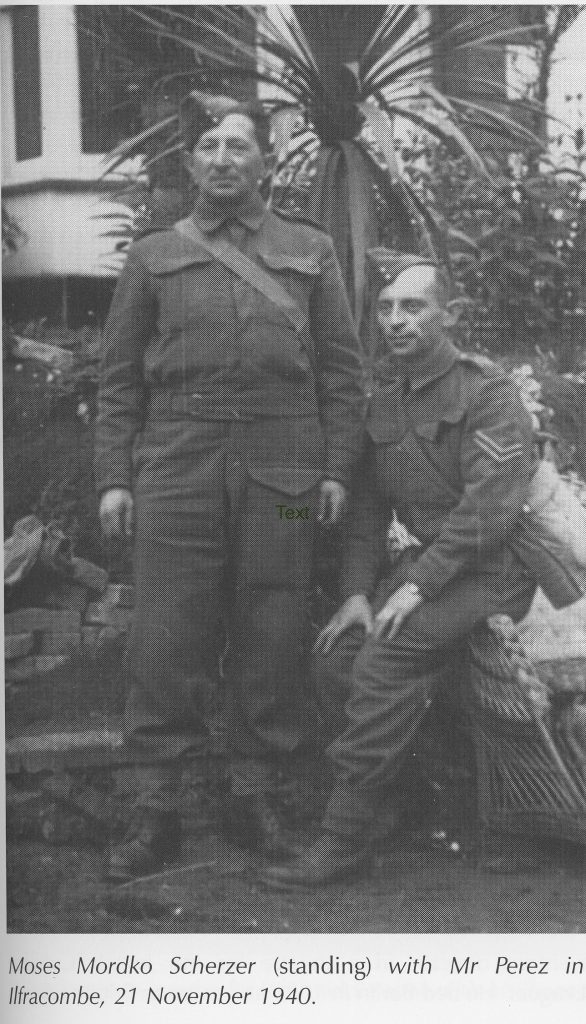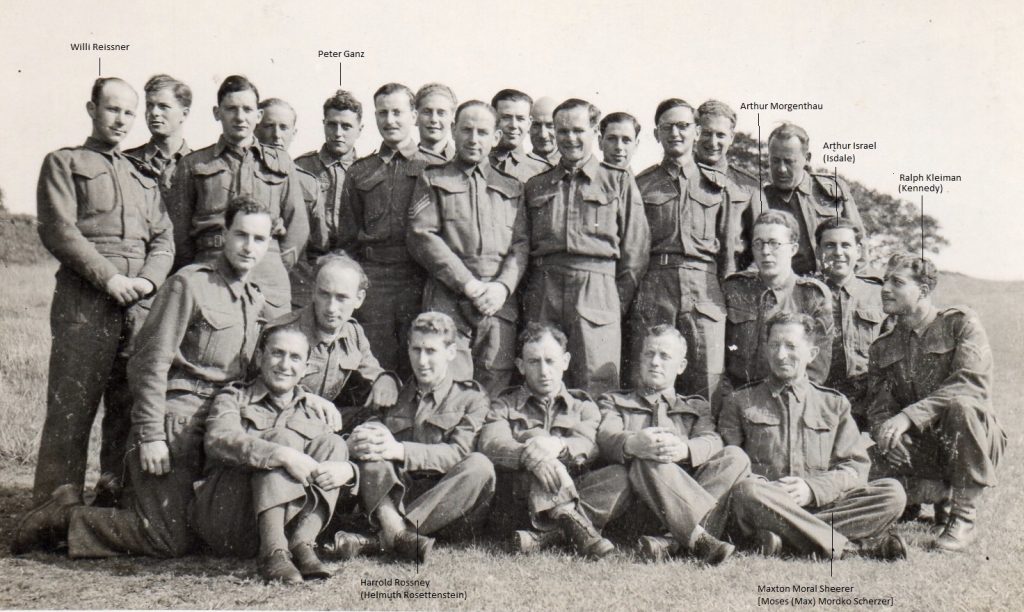Born: Nepolokoz, Austria, 9 March 1897
Profession in country of origin: Banking; wholesale groceries
Arrived in Britain as a refugee from Austria in April 1939
Documents
Male enemy alien - Exemption from internment - Refugee
Surname: Scherzer
Forename: Moses Mordko
Alias: -
Date and place of birth: 09/03/1897 in Nepolokoutz (Rumania)
[Hand-written addition: A/3/97 O/C/20]
Nationality: German
Police Regn. Cert. No.: 710 576
Home Office ref: C 1459
Address: Kitchener camp, Richborough, Sandwich, Kent
Normal occupation: Clerk
Present occupation:
Name and address of employer: -
Decision of tribunal: Exempted "C" & 9a
Date 05.10.1939
Whether exempted from Article 6(A): Yes
Whether desires to be repatriated: No
Tribunal District: Richborough Camp Tribunal 7
Signature: Sugden
Source: National Archives, Home Office: Aliens Department: Internees Index, 1939-1947.
Editor’s note: We are not allowed to reproduce National Archives (UK) images, but we are permitted to reproduce the material from them, as shown above.
Memories
My father’s name was Moses Mordko Scherzer (Shearer), but he was always addressed as Max.
My father was born in Nepolokoz, which was in Austria at that time and afterwards was part of Romania. He was an only son. He went to Vienna to study during the years 1916-1917 and then worked for many years in the Anglo-Austrian Bank, until they closed some of their offices.
Max then opened up a wholesale grocery store, until 10th November 1938, when the Nazis came to take the keys and emptied the whole store. On the same morning of 10th November, Max was arrested and sent to Dachau.
"I remember that my mother went to the Jewish committee, went to our Rabbi, and went to the Nazis to get my father out of Dachau. She told my sister and me that the Nazis said that all borders were closed to Jews - nobody wanted us. But they said if you have somewhere that will let people in, we will consider releasing the men who have some papers in their possession. My father had relatives in Canada. My mother sent them a telegram and they answered, saying that whatever help is needed they will be there for him. My mother returned to the Nazis with this message and on the 28th January 1939 my father came home (with a completely shaven head and terribly thin), and said that within three months all men who were released had to leave Vienna. If not, they would be back in Dachau."
Max was released on the 27 January 1939 on this condition that he would leave Vienna within three months. He managed to leave with a transport of other recently released men in April 1939 and travelled to Kitchener camp.
"In Britain, some good people went to Parliament and they decided to let the men who had papers for other countries into Britain. They prepared Kitchener camp for them. My father left Vienna in April with a transport of other men. Sometime afterwards we got mail with his Kitchener camp address."
While Moses was in Kitchener Camp he signed his daughter Alisa onto a Kindertransport, and she left Vienna on the last transport on 22nd August 1939. It was 10 days before her tenth birthday. Alisa spent six years in girls’ refugee hostels. At first they were in Tynemouth, before being evacuated to Windermere.
"We were amongst the very lucky ones; we were a zionistic family: my mother was a member of Wizo [the Women's International Zionist Organization]. My sister was seven years older than me and went to a Zionist youth club. She left for Palestine with a group of boys and girls, with the Youth Aliyah, in January 1939 - while my father was in Dachau. After my Father left for England my mother and I were on our own; then I left, being one of 600 children on the transport. On the 3rd September 1939, on my 10th birthday, the war broke out (I had been 10 days in England at this time). We had no connection with my mother after I left."
At the outbreak of war Max joined the British army: he enlisted in the Pioneer Corps. He and others were on the beach being prepared to be sent to Dunkirk when the army decided not to send men over the age of 40; Max was sent to Westward Ho, and then to Ilfracombe: he continued to serve in the British army in the south of Britain.
On the 4th May 1945 I received a telegram from Red Cross Sweden, which said that my mother is in a hospital in Sweden, having been liberated from Ravensbrück! It's a long story ... My father was discharged from the Pioneer Corps after the end of the war and we got my mother into Britain in January 1946. She told us her whole story, which includes the Łódź Ghetto [Ghetto Litzmannstadt]; Auschwitz - making ammunitions for the Germans; and another two camps. She was forty-eight years old and weighed forty-two kilograms when she was released!"
The family became British citizens, and Max became Maxton Moses Shearer. He was discharged from the army in May 1945 and moved to Glasgow, where he worked as an agent for a pharmaceutical firm from London, in Scotland, northern Ireland, and northern England.
"In October 1949 my parents and I came to Israel to live next to my sister, who was married with two children. My mother passed away at the age of 91 and my father was 100 years old. I was one of the very few lucky ones who had parents at the end of the war, and I very much appreciate this. Hopefully, never again will there be a Holocaust in any part of the world."
Max studied Hebrew when the family arrived in Israel, and found employment as a bookkeeper in the firm of Tnuva in Chadera.
"My parents bought a little house in Givat Olga, near Chadera, and moved there in 1952. My father worked there for many years, until after the usual pension age. They then came to live next door to me in Bet Cherut, and then moved to an Old Age home in Natanya. My father passed away at the age of 100 years and 4 months, from pneumonia. My father, Max, was loved and honored by every one who knew him."
Submitted by Alisa Tennenbaum, for her father, Moses Scherzer
For the last 15 years Alisa has been head of the Kindertransport organization in Israel. She has travelled eight times to Germany and three times to Austria to educate pupils and adults about the Kindertransport rescue and her family’s story during the Holocaust.
Photographs

The photograph is reproduced here by kind permission of Helen Fry from her book, Jews in North Devon during the Second World War: The escape from Nazi Germany and the establishment of the Pioneer Corps (Halsgrove 2005)

